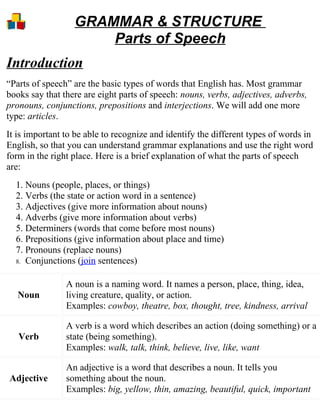
Parts Of Speech
- 1. GRAMMAR & STRUCTURE Parts of Speech Introduction “Parts of speech” are the basic types of words that English has. Most grammar books say that there are eight parts of speech: nouns, verbs, adjectives, adverbs, pronouns, conjunctions, prepositions and interjections. We will add one more type: articles. It is important to be able to recognize and identify the different types of words in English, so that you can understand grammar explanations and use the right word form in the right place. Here is a brief explanation of what the parts of speech are: 1. Nouns (people, places, or things) 2. Verbs (the state or action word in a sentence) 3. Adjectives (give more information about nouns) 4. Adverbs (give more information about verbs) 5. Determiners (words that come before most nouns) 6. Prepositions (give information about place and time) 7. Pronouns (replace nouns) 8. Conjunctions (join sentences) A noun is a naming word. It names a person, place, thing, idea, Noun living creature, quality, or action. Examples: cowboy, theatre, box, thought, tree, kindness, arrival A verb is a word which describes an action (doing something) or a Verb state (being something). Examples: walk, talk, think, believe, live, like, want An adjective is a word that describes a noun. It tells you Adjective something about the noun. Examples: big, yellow, thin, amazing, beautiful, quick, important
- 2. An adverb is a word which usually describes a verb. It tells you how something is done. It may also tell you when or where Adverb something happened. Examples: slowly, intelligently, well, yesterday, tomorrow, here, everywhere A pronoun is used instead of a noun, to avoid repeating the noun. Pronoun Examples: I, you, he, she, it, we, they A conjunction joins two words, phrases or sentences together. Conjunction Examples: but, so, and, because, or A preposition usually comes before a noun, pronoun or noun Preposition phrase. It joins the noun to some other part of the sentence. Examples: on, in, by, with, under, through, at An interjection is an unusual kind of word, because it often stands alone. Interjections are words which express emotion or surprise, Interjection and they are usually followed by exclamation marks. Examples: Ouch!, Hello!, Hurray!, Oh no!, Ha! An article is used to introduce a noun. Article Examples: the, a, an GRAMMAR & STRUCTURE — Examples Parts of Speech Sentences using different parts of speech
- 3. Read each sentence and then look at the chart below it. The chart shows the correct part of speech for each word in the sentence. a) The university student studies hard in the school library, so he gets good grades. Nouns Verbs Adjectives Adverbs student studies university hard library gets school grades good Prepositions Conjunctions Determiners Pronouns in so the he b) Some people exercise regularly and eat well, but other people are not as healthy because they spend too much time at home on the couch. Nouns Verbs Adjectives Adverbs people exercise healthy regularly time eat too much well home are couch spend Prepositions Conjunctions Determiners Pronouns at but some they on and other because the
- 4. c) My mother always cooks a delicious dinner for my birthday, and the whole family eats it together happily. Nouns Verbs Adjectives Adverbs mother cooks delicious always dinner eats my together birthday whole happily family Prepositions Conjunctions Determiners Pronouns for and a it the d) The tired children walk slowly to school in the morning, so they always arrive late. Nouns Verbs Adjectives Adverbs children walk tired slowly school arrive always morning late Prepositions Conjunctions Determiners Pronouns to so the they in e) The thin French chef bakes tasty fresh bread daily in his wood stove and sells it quickly from a small window.
- 5. Nouns Verbs Adjectives Adverbs chef bakes thin daily bread sells French quickly stove tasty window fresh wood small his Prepositions Conjunctions Determiners Pronouns in and the it from a
- 6. GRAMMAR & STRUCTURE — Exercises Parts of Speech Answer the following questions to check your knowledge of the parts of speech. Choose the correct part of speech in each sentence. Example Choose the verb in the sentence. My daughter brushes her long hair with a red brush every morning. daughter hair brushes red The correct answer is "brushes". 1. Choose the noun in the sentence. He eats raw fish. he eats raw fish 2. Choose the verb in the sentence. He eats raw fish. he eats raw fish 3. Choose the adjective in the sentence. He eats raw fish.
- 7. he eats raw fish 4. Choose the pronoun in the sentence. He eats raw fish. he eats raw fish 5. Choose the verb in the sentence. My best friend sends me beautiful postcards from her vacations. my postcards sends vacations 6. Choose the preposition in the sentence. My best friend sends me beautiful postcards from her vacations. my her me from 7. Choose the conjunction in the sentence. Jerri loves travelling by car, but she hates travelling by bus. but by she
- 8. travelling 8. Choose the pronoun in the sentence. Jerri loves travelling by car, but she hates travelling by bus. by she bus Jerri 9. Choose the nouns in the sentence. Jerri loves travelling by car, but she hates travelling by bus. Jerri / car / bus travelling / loves / hates but / she / by travelling / by / car 10 Choose the adverbs in the sentence. . Hedy plays tennis beautifully, but she plays squash terribly. plays / Hedy tennis / squash beautifully / terribly Hedy / she